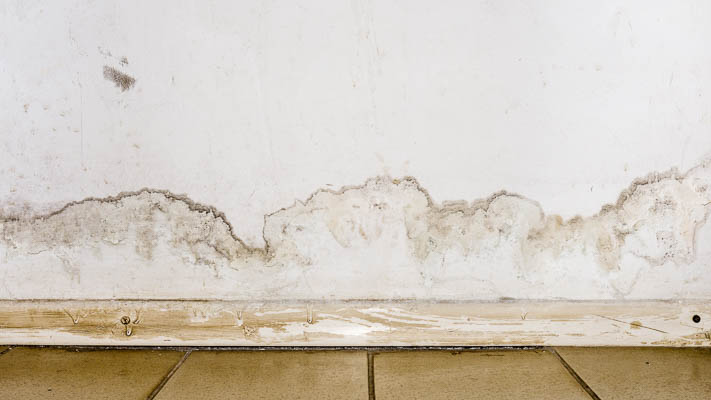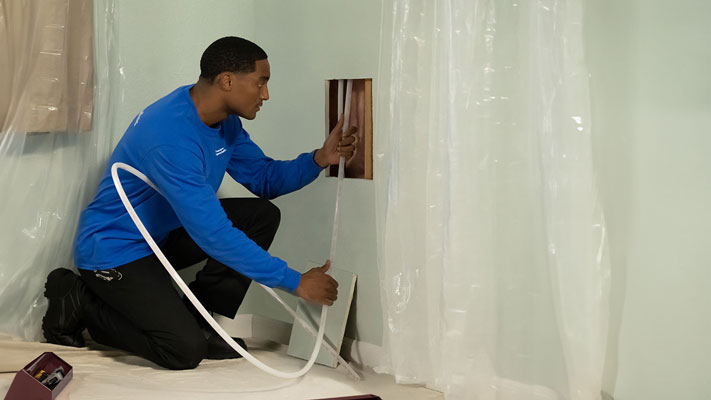What Are the Common Causes of Slab Leaks in Texas?
Slab leaks in Texas result from specific causes influenced by the state's geological and environmental factors. These include:
- Expansive Soil: The expansive clay soil commonly found in Texas is prone to swelling and shrinking based on moisture levels. This movement exerts pressure on the foundation, placing stress on the pipes embedded within or underneath concrete slab. Over time, this constant movement can lead to pipe cracks or corrosion. Texas's hot and dry climate exacerbates the risk of slab leaks as the soil becomes dry, increasing the likelihood of soil movement and subsequent pipe damage.
- Hard Water: The high mineral content in Texas water, particularly in areas with hard water, accelerates pipe corrosion. The chemical composition of the water, coupled with the alkaline nature of the soil in many parts of Texas, contributes to the erosion of pipe materials such as copper pipes and galvanized piping.
- Outdated Plumbing: Urban development, especially in cities like Houston and Dallas, has led to aging infrastructure and outdated plumbing systems becoming more vulnerable to leaks. Older homes often feature plumbing systems like polybutylene pipes and galvanized plumbing, which are more susceptible to leaks due to wear and tear over time, leading to slab leaks.
Understanding these factors is crucial for minimizing the risk of expensive slab leak repairs. If you observe any of the mentioned factors, we have an article that outlines what you need to do if you have a slab leak.
How Do I Know If I Have a Slab Leak in My Texas Home?
It's important to recognize the potential signs of a slab leak in your Texas home. We've made it easy for you by compiling the five most common indicators of slab leaks:
- Increase in Water Bills: A sudden, unexplained rise in your water bill, despite no corresponding increase in water usage or household activities, is a notable sign of a potential slab leak.
- Sound of Running Water: Persistent sounds of running water, even when all faucets and appliances are off, may suggest a hidden leak beneath the concrete slab foundation.
- Dampness or Mold: Continuous dampness or mold growth on floors or walls, particularly in lower levels of the house, could indicate water seepage from a slab leak. Additionally, hot spots on the floor may suggest a leak in hot water lines within or underneath the slab.
- Cracks in Foundation: Unexplained cracks in the foundation or flooring, accompanied by a musty odor in specific areas, are further signs that shouldn't be overlooked.
- Low Water Pressure: Noticeable decreases in water pressure or flow indicate potential disruptions in the plumbing system. For more insights, we have a detailed article discussing the common causes of low water pressure.

If you notice any of these signs, it's essential to address the issue promptly to stop potential structural damage and avoid costly repairs or foundation issues in the future, ensuring the long-term integrity of your home.
We offer an extensive article covering the various warning signs of a leak under the slab.
Does Homeowner's Insurance Cover the Cost of Repairing Slab Leaks in Texas?
Whether your Texas homeowner's insurance covers slab leaks depends on the type of homeowners insurance policy you have.
We've investigated what three of the biggest Texas homeowner's insurance companies cover when it comes to water damage potentially caused by slab leaks.
Allstate Homeowners Insurance
Allstate homeowners insurance policies come in two forms: dwelling cover and personal property coverage.
- Dwelling Cover: Allstate's dwelling cover will pay for fixing damage caused to your home by 'removing the slab and replacing it after the plumbing is repaired, but probably will not pay to fix the plumbing itself.''
- Personal Property Coverage: This coverage includes damage to your belongings, meaning any damage caused by slab leaks to your home's belongings will be covered.
It's important to note that Allstate won't cover slab leak damage to your Texas home for 'plumbing lines that are simply past their prime' or issues arising from general wear and tear of pipes.
Liberty Mutual Insurance
Liberty mutual will cover damages caused by pipe leaks, including those under or in slab, if it is considered 'sudden or unexpected.'
However, they won't cover the cost of damages if, 'the water damage is due to a home maintenance issue'.
The cost to repair or replace burst pipes are not covered under their homeowners insurance, only the damage these leaks may cause.
Hippo Insurance
Hippo's Texas homeowners insurance state that their 'Standard home insurance policies protect your dwelling, personal property, liability and any additional structures on your land.'
However, they exclude coverage for floods, earthquakes, service lines, mold, equipment breakdowns and water backup coverage.
They provide additional flood insurance, but this coverage won't pay for the damage or replacement of 'external forces', such as pipe bursts or leaks.
It is important to know what your homeowners insurance policy will cover in case of a leak under slab.
How to Stop Slab Leaks in Texas: Repipe Through Walls
The only way to prevent a slab leak in your Texas home is to avoid having fresh water lines located in or underneath a concrete slab.
Here at Repipe Specialists, our repipes do just that. We cap off the fresh water lines that are already in or under your slab, leaving them in place. We then route all your new plumbing through walls, ceilings, and attics, avoiding the slab and preventing future slab leaks.

We have many customers who saw their neighbors deal with expensive slab leak damage and chose to take preventive action before they were also struck by a slab leak nightmare.
You can rest assured that you won't have to deal with slab leaks in your Texas home, as there won't be any water pipes embedded in or under the concrete slab anymore.
We have perfected our One-Stop Repipe™ Process and can normally complete a full home repipe in 1-2 days. All our repipes include a lifetime warranty to ensure your peace of mind.
Get your free estimate today
With over 75,000 repipes completed, we've perfected our One-Stop Repipe™ for your home.
Get a Quote for Repiping Your Home
Here at Repipe Specialists, we've completed thousands of slab leak repipes across the country, rerouting the home's plumbing through walls and ceilings so there is no possibility of slab leaks occurring. We also continually get positive customer feedback from customers about their overall home repipe experiences. We often exceed their expectations on:
- Speed: Our repipe crews typically complete a repipe in a day, returning on another day for wall patching.
- Convenience: Through our One-Stop Repipe™ Process, we handle everything from permits, to wall patching, to inspections.
- Cleanliness: Our crews are trained to protect your home while working (we cover all surfaces with protective sheeting), and to clean up fully at the end of each day.
- Peace of Mind: Repipe Specialists is a fully licensed plumber in every state we operate in, and we back all of our repipes with a lifetime warranty.
- Financing programs: To help take the sting out of unplanned repipe expenses, we offer several financing programs.
- Price: As a specialist that performs hundreds of repipes a week, we can deliver high-quality repipes at a lower cost vs generalist plumbers. We have an article that cover repipe cost factors in detail. Our quotes typically range from $4,500 to $15,000 depending on the size and complexity of your project.
Schedule a free in-home consult, and one of our local repipe consultants will explain all your repipe options and provide you with a written, fixed-price quote. Get a repipe and avoid Texas slab leaks forever.

